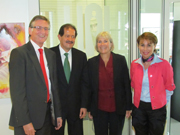News
UNI presses case for worker rights at multinationals with Colombia VP

The Colombian Vice Preisdent Angelino Garzon came to UNI’s head office in Nyon to discuss anti-union abuses by multinationals operating in Colombia and how to end the culture of impunity that has trapped workers in a climate of fear. The meeting came as part of UNI’s campaign to support Colombian unions in their fight for human and workers’ rights and to end the climate of fear for workers who want to unionise. The meeting came as part of UNI’s campaign to support Colombian unions in their fight for human and workers’ rights and to end the climate of fear for workers who want to unionise.
“Colombia is a top priority for us,” said UNI Deputy General Secretary Christy Hoffman.
“We have common ground in holding companies to account not only in Columbia but elsewhere. However, it must be said that the levels of violence (against Colombian trade unionists) are unacceptable.”
Thursday’s meeting in Nyon was part of ongoing engagement with the Colombian government. When the UNI America’s Executive Committee met in Colombia in April to focus on support for Colombian trade unions a UNI delegation headed by UNI General Secretary Philip Jennings met with Garzon to discuss how to change the appalling human rights record.
UNI Americas Regional Secretary Adriana Rosenzvaig has worked with the Colombian affiliates to build a common platform. The aim is to build a dialogue with the major multinationals in UNI sectors in Colombia to change the culture of violence and anti-unionism.
Colombia is the most dangerous country in the world for trade unionists with more than 2850 killed in the last 25 years.
UNI has asked for the government to push for a proper investigation of the 2008 murder of Leonidas Gomez Rozo, a Citibank worker and leader of banking union UNEB. Police have not made an adequate investigation of his killing, UNI said.
Vice President Garzon told UNI he would follow up on the case.
Hoffman welcomed the commitment of the Vice President to work with UNI and Colombian unions on their common goals, including holding multinationals to account for their labour practices in Colombia, ending illegal practices like asking workers to sign contracts to ensure they don’t join a union (pactos collectivos) and fostering social dialogue to improve trade union and workers rights.
“We must show the good practices and call attention to the bad practices,” Garzon said. He has committed to holding a forum with UNI to bring trade unionis and executives from multinationals together to improve the atmosphere for trade union rights and fight the climate of fear.
He also promised to look into the threats against a trade union leader at Prosegur. The Spanish security company’s Colombian operations are rife with anti-union tactics and intimidation and one of the union leaders is facing threats on his life.
UNI presented the case of Telefonica, the Spanish based company that has recently increased its holdings in Colombia and has also used a wide array of tactics to create a hostile and fearful workplace atmosphere for its workers.
One tactic Telefonica uses is to subcontract out work to cooperatives to create a less secure workforce with high turnover and few rights and protections for union activity. Colombian law prohibits the use of cooperatives for core work but does not define it and so Telefonica has continued to use a high number of these workers to perform core tasks.
UNI called on Garzon to intervene and help bring Telefonica to the table to discuss its operations and voluntarily negotiate with union representatives a definition of core work to ensure that work is only performed by direct employees.
UNI also raised the case of Edwin Velasquez Ayala, a Deutsche Post DHL worker and trade unionist who was forced to take a lie detector test administered by an aggressive former military officer before being fired by the German logistics company.
UNI shared the story of French supermarket chain Carrefour with President Garzon. UNI welcomes recent changes from the company to improve workers’ rights, including cutting its use of cooperatives for bagging groceries and hiring 600 workers directly for those jobs.
Garzon said Carrefour could be used as a model of corporate behaviour for other multinationals to follow.
Photo: Philip Jennings, Vice President Garzon, Christy Hoffman, Ambassador Alicia Victoria Arango Olmos

